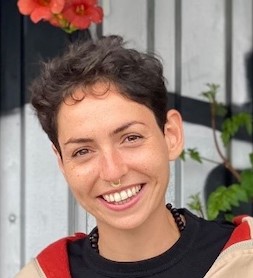“Cultures with long memories, still connected to their oldest ways, know that time is nonlinear, circular, mysterious.” –adrienne maree brown
“If you cannot imagine a future that you would want to be a part of because of the trauma of your past, that’s a recipe for despair.” –The Rev. Pamela L. Werntz
In Jewish cosmology, we start with darkness. The day begins at sunset, and the year begins with Fall. Time cycles are spiral-linear, which means to me psychosomatically (or how I understand this with my body-mind) that every September I feel closer to the person I was last September, a year ago, than the person I was in August, a month ago. When the season changes, the leaves turn, the High Holidays come around, and l return to the parts of myself that usually hide away in the darkness. My introvert raises their head again, demands to be acknowledged. Shadow-work begins; I feel moodier, sleepier, more impatient than during other seasons. So I deactivate my social media and stop making so many plans. I take the time to critically examine where these emotions are coming from, what pains need more inspection, what grief can be released and cleared. I till the soil of my emotional body, preparing for another season.
This year is starting slow for me, across the board. I’m not the only one experiencing this; Reverend Pam shared that she was experiencing this also, and maybe you are, too. In my body I feel a sluggishness, a heaviness, a tiredness that is altogether unfamiliar; and I don’t believe turning 27 is the culprit. As we were discussing this with Pam, I found myself thinking back to something adrienne maree brown wrote: [1]
Cultures with long memories, still connected to their oldest ways, know that time is nonlinear, circular, mysterious. When we are facilitating a space and we remember that time can bend, we focus not on time scarcity but on the people in the room, the presence, and the work that must be done. I have been in so many rooms where we bent time, expanding it for a big emotion to move through, reversing it to undo harm, finding ourselves satisfied well before our planned ending time. I always consider that maybe we didn’t bend it, but the universe, a great spirit, approved our work and opened it for us.
Reflecting on this, I asked myself, what are the ways in which the rituals of the High Holidays, as well as those of drama therapy, offer opportunities to bend time, to heal the present and the future by engaging with our past? In what ways might we as a culture be bending time right now?
Possibly offering connection between religious ceremony, drama therapy, and this concept of bending time, Pendzik’s writings on dramatic reality offer: “In performance activities, time is not uniform and linear as in real life, but ‘is adapted to the event, and is therefore susceptible to numerous variations and creative distortions.’” [2] During the High Holiday ceremonies that mark the new year, the legacies of the Jewish past are invoked so as to better inform our future. In the words of Reverend Pam, “When we’re looking at Scripture, we’re not asking did this really happen, but is it happening now?” Meanwhile, each person takes accountability for the actions of the last year of their lives in preparation for the next; in other words, an entire year is both repented and prepared for in ten days, as we collectively observe, mark, and bend time.
I’ll end by saying this: I believe that as a culture, we are collectively engaged with bending time right now, looking at our painful histories and seeking a path back to wholeness. I wonder what rituals could aid us in this process; I wonder what ceremonies could be offered. I wonder how intentionally we could include spirituality and embodied practice in this journey. Finally, I wonder if maybe, for those of us struggling through the sluggishness of a bending time, we could offer ourselves a little bit of grace and patience as we do so.
1. adrienne maree Brown, Holding Change: The Way of Emergent Strategy Facilitation and Mediation (Chico CA : AK Press, 2021, p.19).
2. Susana Pendzik, “On Dramatic Reality and Its Therapeutic Function in Drama Therapy”, The Arts in Psychotherapy, 2006 (PDF available from Academic).
2. Susana Pendzik, “On Dramatic Reality and Its Therapeutic Function in Drama Therapy”, The Arts in Psychotherapy, 2006 (PDF available from Academic).


